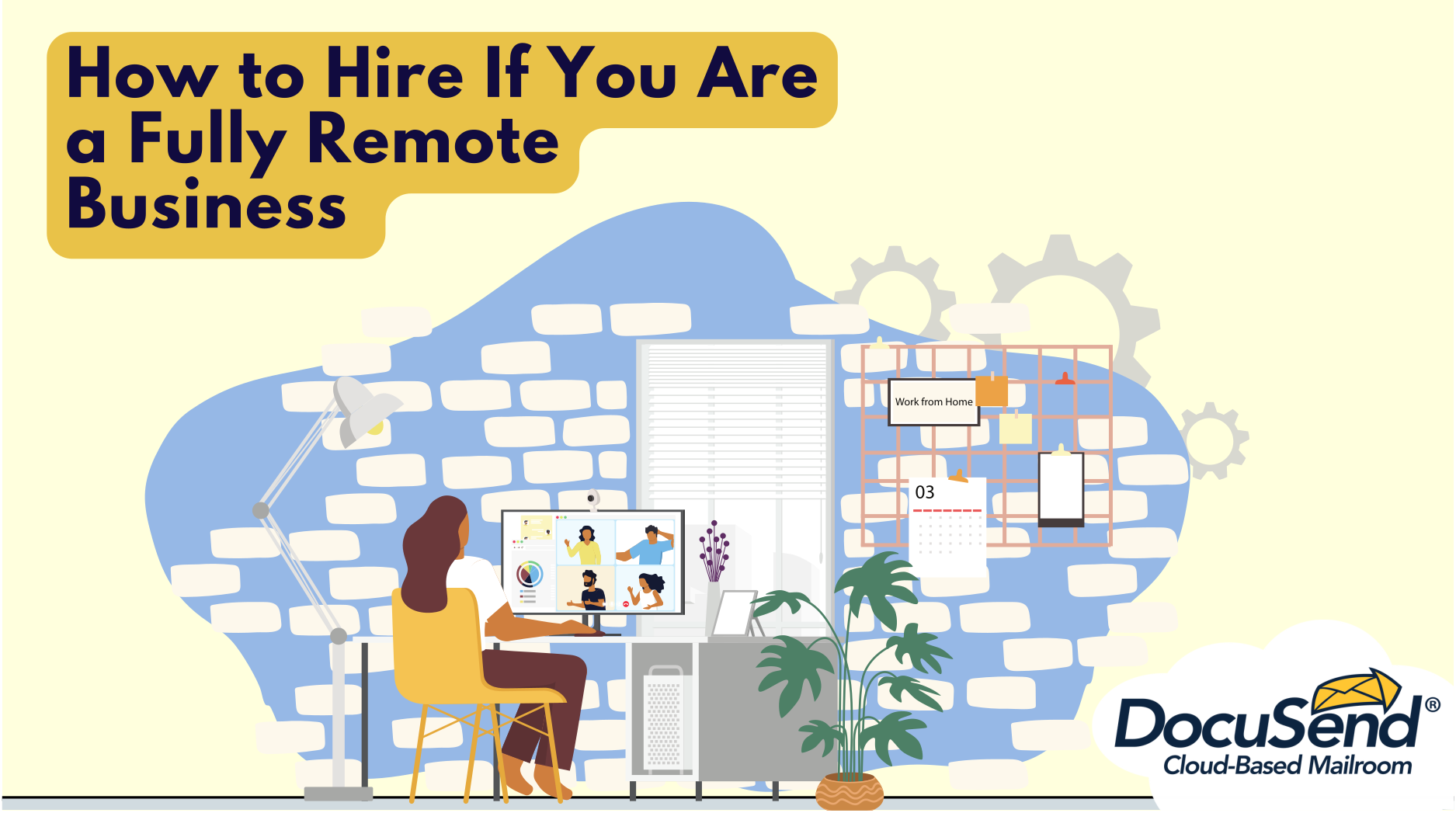How to Hire If You Are a Fully Remote Business

During the COVID-19 pandemic, remote work became a necessity for many businesses in order to survive, and in recent years it has not only gained in popularity but has also increasingly become the preferred way of working for many. As a result, many companies have had to adapt to semi or fully remote work environments, which has brought about unique challenges when it comes to hiring.
In the past, remote work was mainly the domain of online freelancers such as content writers, graphic artists, and web designers, but these days there are a plethora of high-level remote jobs available in various fields and industries, such as remote lawyer, customer service representative, educator, and much more. However, hiring remotely differs from traditional hiring processes, and companies have had to adjust their approach accordingly, employing different skills and strategies.
If you're a fully remote business, you may be wondering how to attract top talent, conduct interviews, and make hiring decisions when you’re not able to meet candidates in person. In this article, we teamed up with experts from job aggregator Jooble to explore the best practices for hiring in a fully remote business environment.
Steps to Hiring If You Are a Fully Remote Business
Hiring for a fully remote business requires consideration of the unique challenges presented by a completely virtual work environment. By adapting their recruitment processes, fully remote companies can still hire the best candidates for their business.
Here are the steps to hiring remote employees:
1. Define the roles and identify the skills required
Working remotely is very different from working in a traditional physical environment, and it’s not for everyone. That’s why clearly defining the roles you need to fill and making a list of the ideal skills and qualities required of new employees are so important.
These are some of the considerations you should include in your list to help with the hiring process:
- Define the roles: Start by defining the roles that you need to fill in your remote business. Determine the responsibilities and duties of each role, and what kind of experience and qualifications are needed for the job.
- Consider the challenges: Consider the specific challenges of working remotely, such as communication, collaboration, and time management. You will need to ensure that applicants have the discipline to work independently and are comfortable with technology and virtual communication tools.
- Look for self-starters: When hiring for remote positions, look for employees who are disciplined self-starters and don’t need constant supervision or policing.
- Communication skills: Competent communication skills are critical when working remotely. You will need to hire employees who are excellent communicators and can clearly convey information through email, chat, or video conferencing.
- Technical skills: Ensure that each candidate has the technical skills necessary to perform their job remotely. This may include proficiency with virtual communication tools, project management software, or other technology specific to their role.
2. Create an attractive job listing
Now that you know what you’re looking for in a potential employee, the next step is to create an attractive job listing. Your job listing should clearly outline the job responsibilities, required skills and qualifications, and any other pertinent information. When creating an attractive job listing for hiring a remote worker, consider the following:
- Write a clear and detailed job description: Be specific about the job duties, required skills and experience, and any necessary qualifications. A well-written job description can help attract the right candidates and filter out those who may not be a good fit.
- Highlight the benefits of remote work: Emphasize the advantages of working remotely, such as flexible working hours and improved work-life balance.
- Provide information on the company's tools and resources: Mention the tools and resources that the company provides to help remote workers be productive and stay connected.
- Include information about compensation and benefits: Be transparent about compensation and any benefits offered by the company.
- Optimize for search engines: Use relevant keywords in the job title and description to make it easier for potential candidates to find the job listing in search engines.
3. Conduct effective virtual interviews
Conducting virtual interviews is a crucial part of hiring remote workers. Without the ability to meet candidates in person, a virtual interview is the only way to evaluate a candidate’s skills, experience, and fit for the company.
Here are some best practices for conducting effective virtual interviews:
- Choose the right video conferencing tool
The first step in conducting virtual interviews is to choose the right video conferencing app such as Zoom or Google Meet. Choose a tool that’s reliable and easy to use and offers features such as screen sharing, chat, and recording. - Test your technology
Before the interview, test your technology to ensure that everything is working properly. Check your internet connection, microphone, and camera to make sure that there are no technical issues that could disrupt the interview. - Set up a distraction-free environment
Make sure that you conduct the interview in a distraction-free, professional environment. Choose a quiet location with good lighting, and remove any potential distractions such as pets or family members wandering in during an interview. - Have your list of interview questions ready
Your list of interview questions prepared in advance should be designed to help you evaluate the candidate's fit for the role. Focus on questions about the applicant's previous experience working remotely, their communication skills, and their ability to work independently and collaborate virtually. - Evaluate communication skills
Since remote workers will be communicating virtually, you will need to evaluate the candidate's communication skills during the interview. Ask questions that require the candidate to give detailed answers to job-related questions. - Provide information about your company and its goals
Provide the candidate with information about your company’s culture, goals, work schedule, and communication tools. Providing a realistic preview will help the candidate make an informed decision about whether the job is a good fit for them. - Follow up promptly
Finally, follow up promptly after the interview. Send a thank-you email to the candidate and let them know what the next steps in the process are.
4. Look for red flags when hiring remotely
Some employees may struggle to adapt to working remotely, especially if their previous work experience has been limited to working in a traditional physical environment.
Some red flags to look out for:
- Feelings of isolation: Many people enjoy the interaction and camaraderie that comes with working in a regular office. When hiring remotely, watch out for indications that a potential employee could feel isolated or have other doubts about working solo.
- Poor communication skills: Communication is critical for remote work. If an applicant struggles to communicate effectively or has trouble answering questions clearly during the interview process, this could be a red flag. It may indicate that they will struggle to communicate effectively going forward.
- Lack of self-discipline or motivation: Remote work requires a high level of self-discipline. If a candidate seems disorganized, has a poor work ethic, or struggles to manage their time effectively, the chances are they’re not the best fit for the job.
- Technology issues: In a remote work environment, technology is critical. If a candidate finds it difficult to use technology during the interview or experiences technical problems, it may indicate that they will struggle to adapt to remote work.
- Lack of experience with remote work: While remote work experience isn't always necessary, it can be a red flag if a candidate has no experience working remotely and seems unwilling to learn new skills. Look for candidates who have demonstrated the ability to work independently and manage their time effectively in a virtual environment.
5. Onboard new hires
Once you've hired a new remote employee, it's important to onboard them effectively. Onboarding in a remote setting requires additional planning and effort to ensure that the new employee feels welcomed and has a clear understanding of their role and responsibilities.
Consider creating an onboarding plan that includes a detailed training schedule and regular check-ins with the new employee. Ensure that the new employee has the necessary equipment and tools to work efficiently from home.
Some tips to onboard remote workers:
- * Send a personal welcome message to the new remote hire and introduce them to the team via email or video call.
- * Set clear expectations for the new hire by outlining their role, job responsibilities, and performance expectations.
- * Provide access to relevant training materials and resources to help them learn about the company's culture, processes, tools, and procedures.
- * Use video calls for face-to-face onboarding sessions and regular check-ins. This allows the new hire to ask questions and receive immediate feedback.
- * Provide regular feedback to the new hire on their progress, and encourage open communication to help them address any issues or concerns they may have.
Final Thoughts
Hiring for a remote position may require different strategies than traditional hiring processes, and running a fully remote business will undoubtedly have its challenges, but it does not mean that you cannot hire the best talent for your fully remote business to help you build a successful remote team and make your business thrive.

